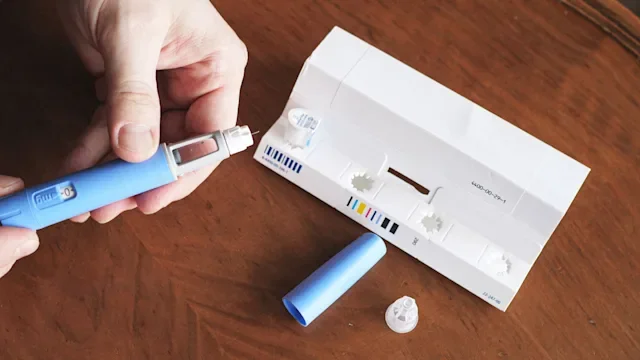Key takeaways:
In clinical trials, some people developed pancreatitis while taking Mounjaro. But it’s not yet clear if Mounjaro directly causes pancreatitis.
Pancreatitis is a serious medical condition. Seek medical care right away if you have symptoms of pancreatitis while taking Mounjaro.
It’s not clear if Mounjaro is safe for people with a history of pancreatitis in the past. But experts recommend stopping Mounjaro if you develop pancreatitis while taking it.
Save on related medications
Pancreatitis causes severe abdominal pain, nausea, and vomiting. It’s a serious condition. If not treated properly, pancreatitis can be life-threatening. That’s why reports of people developing pancreatitis while taking Mounjaro are getting so much attention.
Mounjaro is an injectable medication that’s FDA-approved to treat Type 2 diabetes. In clinical trials, Mounjaro was shown to cause gut-related side effects like nausea and vomiting. But the relationship between Mounjaro and pancreatitis is less clear.
Here’s what the science says about the link between Mounjaro and pancreatitis.
Search and compare options
Does Mounjaro cause pancreatitis?
There have been reports of people developing pancreatitis while taking Mounjaro. But right now, there’s no clear evidence that Mounjaro directly causes pancreatitis. The link is still being studied.
In clinical trials, some people taking Mounjaro developed pancreatitis. But cases of pancreatitis were rare. This makes it difficult to say whether Mounjaro directly caused these cases of pancreatitis.
There are a few reasons why the link between Mounjaro and pancreatitis isn’t clear.
1. Not enough data
To determine if a medication is causing a rare side effect, it must be studied in a big group of people. This can help show whether a rare side effect was just a coincidence or truly related to the medication.
There isn’t a lot of available evidence on the long-term effects of Mounjaro because it’s a newer medication. But there are some initial studies that looked at the rates of pancreatitis in people taking Mounjaro.
One study compared the rates of pancreatitis in two groups of people with diabetes:
Those taking injectable diabetes medications like Mounjaro or Ozempic (semaglutide)
Those taking other diabetes medications
The researchers found that people taking injectable medications weren’t more likely to develop pancreatitis than people taking insulin or other diabetes medications.
Another study found that the rates of pancreatitis in people taking Mounjaro for diabetes were the same as those taking a placebo (no medication) or insulin.
And yet another study found that people taking Mounjaro were slightly less likely to report pancreatitis than those taking other types of injectable medications to treat diabetes.
Mounjaro isn’t the only medication linked to pancreatitis. Learn more about the link between Ozempic and pancreatitis.
Mounjaro vs. Ozempic for Type 2 diabetes: Five key differences to know about.
Is compounded Mounjaro safe? Here’s what to know.
These studies seem to suggest that people taking Mounjaro don’t develop pancreatitis more often than people receiving other diabetes treatments. But these studies can’t say for sure that Mounjaro doesn’t cause pancreatitis. More research is needed to know for sure.
2. Other causes of pancreatitis
Even if someone develops pancreatitis while taking Mounjaro, that doesn’t mean the medication is the cause. In all the studies mentioned above, some people taking Mounjaro developed pancreatitis. So did people who took other diabetes medications.
That’s because pancreatitis can be triggered by many different things, not just medications. For example, pancreatitis can be triggered by:
Gallstones
Alcohol use
High triglycerides (a type of fat from your diet)
This means it’s possible for someone taking Mounjaro to have pancreatitis for reasons other than the medication. And many of these reasons are more common than pancreatitis caused by medication use.
Who is most at risk for medication-related pancreatitis?
With all this uncertainty, how do you know if you’re at risk for developing pancreatitis while taking Mounjaro?
Some things that can increase your risk of pancreatitis include:
A history of gallstones or other gallbladder problems
Having relatives who had pancreatitis
Taking other medications linked to causing pancreatitis, such as azathioprine, thiazides, furosemide, estrogens, and certain antibiotics
High triglyceride levels
Having a body mass index (BMI) over 30
Talk to your healthcare team about these risk factors before starting Mounjaro. They can help you decide if Mounjaro is right for you.
Should you take Mounjaro if you’ve had pancreatitis?
People with a history of pancreatitis weren’t included in Mounjaro clinical trials. Researchers don’t know if people have a higher risk for developing pancreatitis while taking Mounjaro if they’ve had pancreatitis in the past.
You may be able to take Mounjaro if you have a history of pancreatitis. Talk with your healthcare team about the risks and benefits of Mounjaro. Together, you can determine if taking Mounjaro is the right choice for you.
What should you do if you’re experiencing symptoms of pancreatitis?
If you develop symptoms of pancreatitis while taking Mounjaro, seek medical care right away.
Pancreatitis symptoms include:
Pain in your upper abdomen that may radiate (travel) to your back
Nausea and vomiting
Fever
Not being able to keep down food or drink
Fast heart rate
Most of the time, people who have pancreatitis need to be treated in the hospital. If pancreatitis is severe, you may need to be treated in an intensive care unit (ICU).
Right now, it’s not clear whether it’s safe to restart Mounjaro if you’ve developed pancreatitis while taking the medication. So, if you develop pancreatitis, you may need to switch to a different type of diabetes medication after you recover.
How to reduce the risk of pancreatitis when taking Mounjaro?
There are steps you can take to lower your risk of developing pancreatitis, like:
Limiting or avoiding alcohol intake
Limiting fatty and fried foods and eating more whole grains, fruits, and vegetables
Getting treatment for high triglycerides
Getting treatment for gallstones
Frequently asked questions
People have developed pancreatitis while taking semaglutide (Ozempic, Wegovy). This medication is a glucagon-like peptide-1 (GLP-1) receptor agonist. There have been cases of people developing pancreatitis while taking GLP-1s like Trulicity (dulaglutide) and Victoza (liraglutide). But it’s not clear whether any of these medications directly cause pancreatitis.
Pancreatitis is treated with pain medications, IV fluids, and other treatments to help support the body. Pancreatitis can lead to serious complications that may need surgery and other types of treatments.
Mounjaro’s most common side effects include nausea, vomiting, and bowel changes. Serious complications, like pancreatitis, are rare.
People have developed pancreatitis while taking semaglutide (Ozempic, Wegovy). This medication is a glucagon-like peptide-1 (GLP-1) receptor agonist. There have been cases of people developing pancreatitis while taking GLP-1s like Trulicity (dulaglutide) and Victoza (liraglutide). But it’s not clear whether any of these medications directly cause pancreatitis.
Pancreatitis is treated with pain medications, IV fluids, and other treatments to help support the body. Pancreatitis can lead to serious complications that may need surgery and other types of treatments.
Mounjaro’s most common side effects include nausea, vomiting, and bowel changes. Serious complications, like pancreatitis, are rare.
The bottom line
Pancreatitis is a serious health problem in which the pancreas becomes inflamed. There have been reports of people developing pancreatitis while taking Mounjaro. But it’s not clear yet if Mounjaro causes pancreatitis. Contact your healthcare team right away if you develop pancreatitis symptoms while taking Mounjaro.

Why trust our experts?


References
Caruso, I., et al. (2024). The real-world safety profile of tirzepatide: pharmacovigilance analysis of the FDA Adverse Event Reporting System (FAERS) database. Journal of Endocrinological Investigation.
Eli Lilly and Company. (2022). Mounjaro (tirzepatide) Injection, for subcutaneous use [package insert].
Gapp, J., et al. (2023). Acute pancreatitis. StatPearls.
Grennan, K., et al. (2025). Fatal, fulminant, necrotizing pancreatitis associated with recent tirzepatide initiation. JCEM Case Reports.
Kamrul-Hasan, A. B. M., et al. (2024). Pancreatic safety of tirzepatide and its effects on islet cell function: A systematic review and meta-analysis. Obesity Science & Practice.
Mando, N., et al. (2024). Acute pancreatitis caused by tirzepatide. Cureus.
Nassar, M., et al. (2024). Decreased risk of recurrent acute pancreatitis with semaglutide and tirzepatide in people with type 2 diabetes or obesity with a history of acute pancreatitis: A propensity matched global federated TriNetX database-based retrospective cohort study. Diabetes & Metabolic Syndrome.
National Health Service. (2022). Prevention: Acute pancreatitis.
National Institute of Diabetes and Digestive and Kidney Diseases. (2017). Symptoms & causes of pancreatitis. National Institutes of Health.
Nieto, L. M., et al. (2025). Glucagon-like peptide-1 receptor agonists use does not increase the risk for acute pancreatitis and is associated with lower complications in patients with type 2 diabetes who develop acute pancreatitis: A multicenter analysis. The American Journal of Gastroenterology.
Quinlan, J. D. (2014). Acute pancreatitis. American Family Physician.
Weiss, F. U., et al. (2019). Etiology and risk factors of acute and chronic pancreatitis. Visceral Medicine.
Weissman, S., et al. (2020). Ever-increasing diversity of drug-induced pancreatitis. World Journal of Gastroenterology.

















